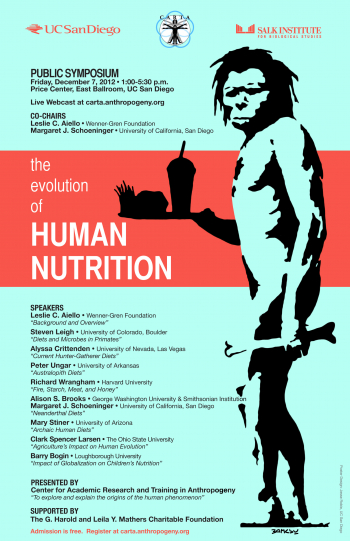The Evolution of Human Nutrition
Leslie Aiello, University College London
Margaret Schoeninger, UC San Diego
Tracing the evolution of the human diet from our earliest ancestors can lead to a better understanding of human adaptation in the past. It may also offer clues to the origin of many health problems that we currently face, such as obesity and chronic disease. The CARTA public symposium on "The Evolution of Human Nutrition" brought together scientists from a wide variety of backgrounds to explore the diets of our ancestors. What did early humans eat? Were the nutritional requirements and dietary needs of contemporary humans established in our prehistoric past? At this symposium, a lively discussion took place about the changing diets of our ancestors - from australopith diets to current hunter-gatherer diets - and what role these dietary transitions played in the evolution of humans.
Media for each talk can be played by clicking on icons in the table below, or by clicking on the individual talk titles below and then the attachment file at the bottom of the page.
| Speakers | Media | Session |
|---|---|---|
 Margaret Schoeninger  Ajit Varki |
|
Welcome and Opening Remarks |
 Leslie Aiello |
|
Background and Overview The evolution of human nutrition has gained general prominence in recent years through the popularity of the paleolithic diet that is also popularly referred to as the paleodiet, caveman diet or Stone Age diet. Interest in the paleodiet is largely a response to the epidemic of diseases such as obesity, type-2 diabetes, cardiovascular disease and high blood pressure (among many others) that plague modern civilization. The basic premise is that by returning to the diet of our pre-agriculture,... read more |
 Steven Leigh |
|
Diets and Microbes in Primates Human microbiomes, or communities consisting of the microorganisms that live in, on, and around us, have profound effects on health, disease, and normal host function. The intestinal microbiome is an especially important "partner" in dietary adaptations, functioning to convert foods and food components that are otherwise inaccessible into useful nutrition to the benefit of the host organism. Our project explores the nature of the primate microbiome with the goal of understanding the impacts of... read more |
 Alyssa Crittenden |
|
Current Hunter-Gatherer Diets The diet composition of hunter-gatherer populations continues to be implicated in the reconstruction of dietary models and social behavior of early members of the genus Homo. Diet has been linked to the evolution of the enlarging hominin brain, the sexual division of labor, routine food sharing, cooperative breeding, and family formation. Despite this significance, few quantitative studies are available; the cross-cultural data used for many of the reconstructions remains anecdotal and was not... read more |
 Peter Ungar |
|
Australopith Diets Robert Atkins wrote in The New Diet Revolution of our ancestors “eating the fish and animals that scampered and swam around him, and the fruits and vegetables and berries that grew nearby.” This makes intuitive sense, but where’s the evidence? This presentation considers the fossils themselves and what they can teach us about the diets of our early hominin forebears. It focuses on a key part of human evolution, when our ancestors and near cousins, the australopiths, began to descend from the... read more |
 Richard Wrangham |
|
Fire, Starch, Meat, and Honey Unlike all other free-living animals, human populations need to eat much of their food cooked. When and why this evolutionary commitment to the control of fire began is a fascinating evolutionary puzzle. We now know that cooking causes starch and meat to provide much extra energy; that cooked food saves so much eating time that it makes dedicated hunting possible; and that honey-eating by African hunter-gatherers offers a remarkable clue that the control of fire is an ancient habit. From an... read more |
 Alison Brooks  Margaret Schoeninger |
|
Neanderthal Diets Neanderthals present an enigma for which there is no consensus about their cognitive and behavioral capacities compared to those of anatomically modern humans. With regards to nutrition, Neanderthals are commonly presented as top carnivores based largely on analyses of the organic fraction of their bones. Here we consider their wide geographical and temporal range, which stretched from the Levant to northern Europe, and eastward to Iraq in both glacial and interglacial periods. The resultant... read more |
 Mary Stiner |
|
Archaic Human Diets What is the legacy of the human ecological footprint in deep time, and how might this legacy relate to the evolution of human social and energy networks? At least three major transitions can be seen from the archaeological record of meat-eating. The first of these transitions of interest was the development of hominins as big game hunters by roughly 500,000 years ago, followed by diversification of the meat diet and new patterns of labor collaboration sometime between 100-50,000 years ago. At... read more |
 Clark Larsen |
|
Agriculture's Impact on Human Evolution Beginning some ten to twelve thousand years ago, fully modern Homo sapiens began to alter their diets in ways that would profoundly impact their lives and livelihoods on a global scale. Starting from at least ten independent centers of plant and animal domestication in Asia, South and North America, and Africa, the shift from foraging to farming laid the foundation for remarkable increase in population size and fundamental changes in health, quality of life, and workload. This presentation... read more |
 Barry Bogin |
|
Impact of Globalization on Children's Nutrition Globalization is, in part, an economic force to bring about a closer integration of national economies. Food globalization brings about nutritional transitions. The most common transition today is the shift from a diet based on locally-grown, minimally refined vegetable foods supplemented with small amounts of animal food to the ‘modern diet’ of globally sourced highly processed foods, rich in saturated fat, animal products, and sugar, but poor in some nutrients and low in fiber. The Maya... read more |
 Leslie Aiello  Pascal Gagneux  Margaret Schoeninger |
|
Question and Answer Session and Closing Remarks |
| Attachment | Size |
|---|---|
| 866.45 KB | |
| 343.64 KB | |
| 792.32 KB | |
| 476.7 KB |
If you enjoy this event, please consider supporting CARTA's quest to explore and explain the human phenomenon.


